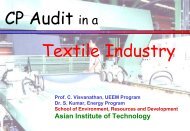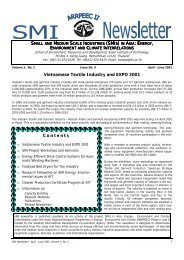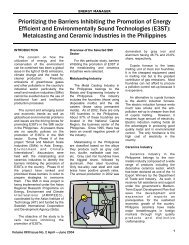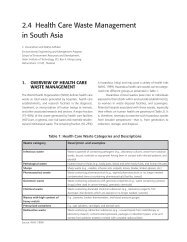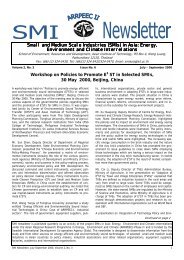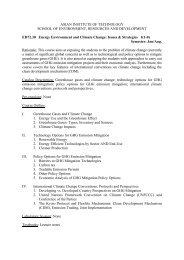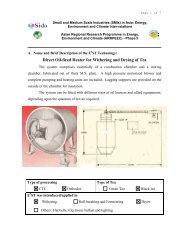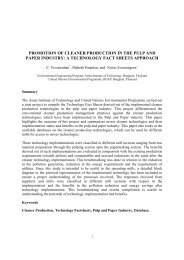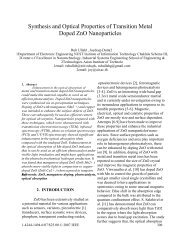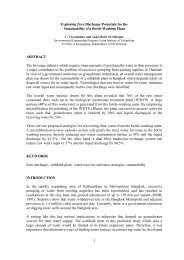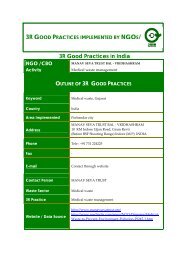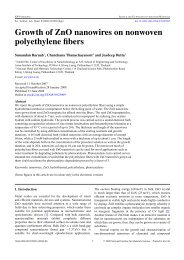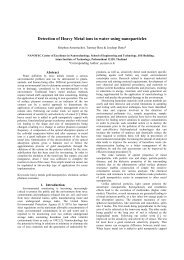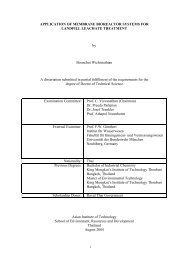A Gap Analysis in Selected Asian Countries, 3R Knowledge Hub ...
A Gap Analysis in Selected Asian Countries, 3R Knowledge Hub ...
A Gap Analysis in Selected Asian Countries, 3R Knowledge Hub ...
Create successful ePaper yourself
Turn your PDF publications into a flip-book with our unique Google optimized e-Paper software.
E-WASTE<br />
No published <strong>in</strong>formation exists on estimation<br />
of quantity and disposition of e-wastes <strong>in</strong> the<br />
country. The <strong>in</strong>formal reports state that the<br />
country imports substantial quantities of<br />
electronic and electrical devices, but everyth<strong>in</strong>g<br />
goes back across the border for major repairs or<br />
as scrap when it gets obsolete.<br />
F<strong>in</strong>d<strong>in</strong>gs<br />
Only very few m<strong>in</strong>or repair shops exist <strong>in</strong> the<br />
country. Government agencies are the major<br />
users of computers, pr<strong>in</strong>ters and<br />
telecommunication facilities. The Department<br />
of National Properties receive/collect all the<br />
discarded government properties <strong>in</strong>clud<strong>in</strong>g<br />
cars and electric/electronic items. It is then sold<br />
to private buyers through open auctions either<br />
as reusable items or as scrap material. The<br />
private parties then send it across the border<br />
for major repairs or as scrap materials. The<br />
electrical/electronic goods procured by the<br />
<strong>in</strong>ternational agencies, private agencies and<br />
<strong>in</strong>dividual households go to secondhand<br />
buyers. When it gets obsolete or requires<br />
major repairs, it goes across the border, ma<strong>in</strong>ly<br />
to India.<br />
GAPS FOR IMPLEMENTATION OF <strong>3R</strong><br />
It is widely understood that apply<strong>in</strong>g <strong>3R</strong>s is an<br />
<strong>in</strong>novative achievement towards tackl<strong>in</strong>g waste<br />
challenges. The success of MSW management,<br />
however, is subjected to proper assessment of<br />
available technology and <strong>in</strong>stitutions that has<br />
proactive policies and relevant legislations<br />
emphasiz<strong>in</strong>g <strong>3R</strong>-based solutions. Recycl<strong>in</strong>g is a<br />
technological ability, whereas reduce and<br />
reuse are management or policy oriented tools.<br />
In Bhutan, recycl<strong>in</strong>g issues were addressed as<br />
early as 1992 <strong>in</strong> the project document of the<br />
solid waste management for Thimphu City, but<br />
it lacked <strong>in</strong> implementation. This perhaps<br />
could be due to primitive technological options<br />
and <strong>in</strong>sufficient awareness of the concept<br />
among national policymakers and dur<strong>in</strong>g<br />
implementation Other than the National<br />
Strategy & Action Plan for the Integrated Solid<br />
Waste Management developed by the M<strong>in</strong>istry<br />
of Works and Human Settlement (MoWHS)<br />
with assistance from UNEP, no national policy<br />
papers address MSW management and,<br />
specifically, the <strong>3R</strong>s issue.<br />
TECHNOLOGY GAPS<br />
For a landlocked mounta<strong>in</strong>ous terra<strong>in</strong> country<br />
highly dependent on imported commodities, it<br />
is essential that appropriate technology be<br />
applied to tackle waste management problems;<br />
at the source as well as at the <strong>in</strong>termediate and<br />
the disposal management systems. The long<br />
distance and high gradient mounta<strong>in</strong> terra<strong>in</strong><br />
roads coupled with road ma<strong>in</strong>tenance<br />
conditions escalates transportation cost. The<br />
s<strong>in</strong>gle location of the disposal site also <strong>in</strong>creases<br />
the transportation distance from most of the<br />
suburbs. Scarcity of manpower especially skilled<br />
workers will<strong>in</strong>g to work <strong>in</strong> waste management<br />
is another daunt<strong>in</strong>g challenge. Isolation of the<br />
disposal sites <strong>in</strong>to the forest loses sight and<br />
attention of the <strong>in</strong>fluential policy makers on<br />
solid waste management issues. Location of<br />
disposal sites<strong>in</strong> upstream water catchment areas<br />
the risk of pollution and contam<strong>in</strong>ation. The<br />
need of decentralized appropriate waste<br />
management centers, waste separation at source<br />
to ease waste management, establishment of<br />
transfer stations to reduce transportation cost<br />
and facilitate waste purification, location of<br />
waste management centers <strong>in</strong> visible areas to<br />
attract attention of all and downstream to<br />
reduce exposure to population are seen as<br />
crucial steps to address waste issues <strong>in</strong> Bhutan.<br />
MANAGEMENT ASPECTS<br />
Other than the Environmental Code of Practice<br />
(ECoP) developed by the NEC <strong>in</strong> 2000 and the<br />
Strategy & Action Plan for ISWM developed by<br />
MoWHS <strong>in</strong> 2006, no solid waste management<br />
specific policy exist. The policy documents<br />
ma<strong>in</strong>ly focuse on forest and bio-diversity<br />
conservation. A solid waste management policy<br />
or legislative tool address<strong>in</strong>g trad<strong>in</strong>g and <strong>in</strong>country<br />
bus<strong>in</strong>ess system, people’s participation<br />
and responsibilities towards achiev<strong>in</strong>g<br />
susta<strong>in</strong>able solid waste management is urgently<br />
required <strong>in</strong> the country. The follow<strong>in</strong>g tables<br />
present an overview of the management,<br />
legislative and policy aspects of the country.<br />
Few specific steps required to improve the solid<br />
waste management situation <strong>in</strong> the country are<br />
highlighted below:<br />
• Sort<strong>in</strong>g out the differences amongst the<br />
<strong>in</strong>volv<strong>in</strong>g agencies and mak<strong>in</strong>g the<br />
compost<strong>in</strong>g plant at Serbithang functional,<br />
Chapter 3: Country <strong>Analysis</strong><br />
21



